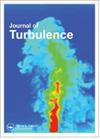Drag reduction by a superhydrophobic surface with longitudinal grooves: the effects of the rib surface curvature
IF 1.5
4区 工程技术
Q3 MECHANICS
引用次数: 0
Abstract
We have investigated the effects of rib surface curvature of a superhydrophobic wall in both laminar and turbulent channel flows. Direct numerical simulation is performed for laminar flows and large eddy simulation is performed for turbulent flows. The parametric study shows that a convex rib surface leads to a lower flow ratethan a flat rib for all Reynolds numbers. A concave rib surface firstly increases and then decreases the flow rate as the curvature angle becomes larger, where an optimal curvature angle exists to maximise flow rate. The value of the optimal curvature angle varies with the Reynolds number. A curved rib surface can modify the distribution of the mean velocity and turbulent statistics near the SH wall. Analysis shows that the overall effect of a curved rib surface on the flow rate is the combination of the wetted area augmentation and the change to the spanwise flow interaction, which depends on the curvature angle and the Reynolds number. The SH wall does not change the fundamental structures of near-wall vortices in turbulent flows. The ridge-groove pattern formed by the curved rib surface can provide additional drag reduction similar to that arising from the surface riblets.具有纵向凹槽的超疏水表面的减阻:肋面曲率的影响
我们研究了超疏水壁肋面曲率对层流和湍流通道流动的影响。层流采用直接数值模拟,湍流采用大涡模拟。参数化研究表明,在任何雷诺数下,凸肋面都比平肋面流速小。凹肋面流速随着曲率角的增大先增大后减小,存在一个最优曲率角使流量最大化。最优曲率角随雷诺数的变化而变化。一个弯曲的肋面可以改变SH壁面附近平均速度和湍流统计的分布。分析表明,弯曲肋面对流量的总体影响是湿润面积增大和展向流动相互作用变化的结合,而展向流动相互作用的变化取决于曲率角和雷诺数。SH壁面不改变湍流中近壁面涡的基本结构。由弯曲肋面形成的脊槽模式可以提供类似于表面肋面所产生的额外减阻。
本文章由计算机程序翻译,如有差异,请以英文原文为准。
求助全文
约1分钟内获得全文
求助全文
来源期刊

Journal of Turbulence
物理-力学
CiteScore
3.90
自引率
5.30%
发文量
23
审稿时长
6-12 weeks
期刊介绍:
Turbulence is a physical phenomenon occurring in most fluid flows, and is a major research topic at the cutting edge of science and technology. Journal of Turbulence ( JoT) is a digital forum for disseminating new theoretical, numerical and experimental knowledge aimed at understanding, predicting and controlling fluid turbulence.
JoT provides a common venue for communicating advances of fundamental and applied character across the many disciplines in which turbulence plays a vital role. Examples include turbulence arising in engineering fluid dynamics (aerodynamics and hydrodynamics, particulate and multi-phase flows, acoustics, hydraulics, combustion, aeroelasticity, transitional flows, turbo-machinery, heat transfer), geophysical fluid dynamics (environmental flows, oceanography, meteorology), in physics (magnetohydrodynamics and fusion, astrophysics, cryogenic and quantum fluids), and mathematics (turbulence from PDE’s, model systems). The multimedia capabilities offered by this electronic journal (including free colour images and video movies), provide a unique opportunity for disseminating turbulence research in visually impressive ways.
 求助内容:
求助内容: 应助结果提醒方式:
应助结果提醒方式:


